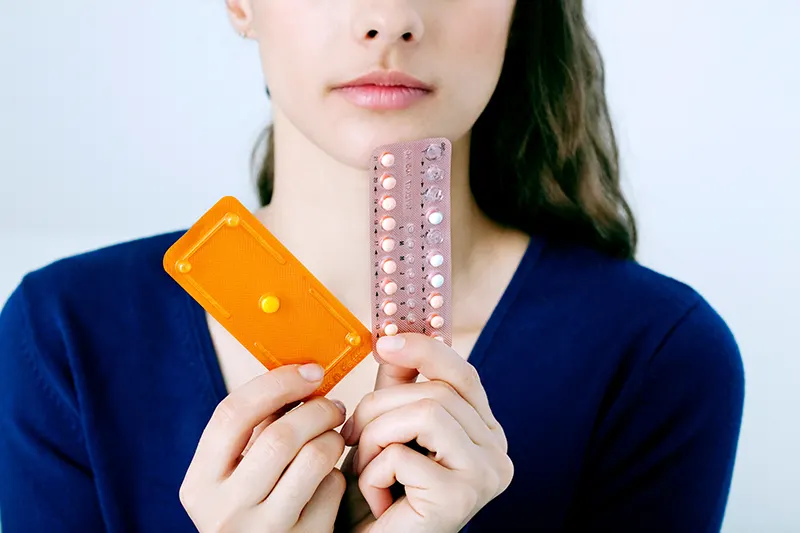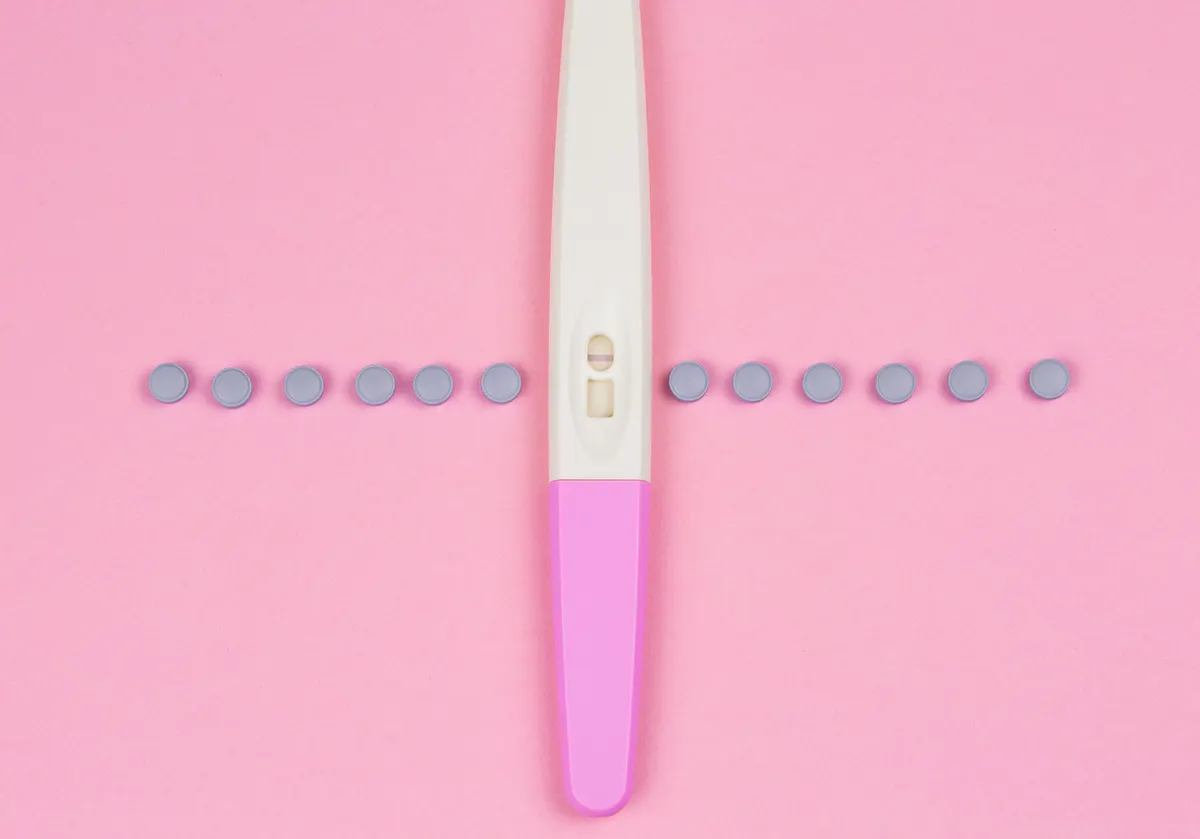If I stop taking birth control pills, will I get pregnant right away?
This is a common question for those planning to start a family after using birth control pills. The doubt often arises as to whether it is possible to regain fertility after a period of contraceptive use.[1]
In this blog, we will explore the approximate time it takes to regain fertility, depending on the contraceptive method you use with your partner.
Since the 1960s, birth control pills have become one of the most popular methods of contraception, allowing reproductive-aged populations to control birth rates. However, in some cases, these were used without medical guidance.[1]

The most well-known effects of birth control pills
Birth control pills contain two hormones, estrogen and progestin, which have the following effects on the female reproductive system:[2]
- They prevent the formation and release of mature eggs.
- The egg moves much more slowly within the fallopian tubes.
- The cervical mucus becomes thicker.
- The endometrium becomes thinner.
What are the reasons fertility may decrease even after birth control? [1-3]
- Polycystic Ovary Syndrome (PCOS), which occurs due to a hormonal imbalance that prevents the egg’s natural passage.
- Primary Ovarian Insufficiency (POI), where a woman’s ovaries do not function properly due to genetic or external factors.
- Uterine problems.
- Blockage in the fallopian tubes.[3]
- Endometriosis, when the tissue lining the inside of the uterus grows outside it.
- Being over 35, as the number of healthy eggs decreases.
- Being a smoker.
- Drinking excessive amounts of alcohol frequently.
- Failing to manage stress levels.
- A poor diet.
- Continuously being overweight or underweight.[3]
- Not treating STDs and infections like chlamydia, gonorrhea, syphilis, and HPV.
- Having irregular or missed periods.
How long do you have to wait to become fertile again?
The time it takes to regain fertility can vary for each woman and also depends on the method of contraception used. It’s important to note that after the age of 25, the ability to conceive begins to decline.[4]
After stopping any form of contraception, it may be harder to conceive, simply because you are older than when you first started using contraceptives.[2-4]
Both partners’ health habits and how they take care of their bodies also play a role.
Now, let’s talk about the most common contraceptive methods and the average time to regain fertility:
- Barrier methods: These include the diaphragm, cervical cap, male and female condoms, and spermicides in the form of foam, sponge, gel, suppository, and film. After stopping these types of contraceptives, you may become pregnant after having unprotected sex.[3-4]
- Combined hormonal methods: These include pills, skin patches, and rings containing estrogen and progestin. After discontinuation, you can become pregnant. 50% of women become pregnant within the first 3 months after stopping treatment, while the rest regain fertility within 12 months.
- Progestin-only hormonal methods: These include pills, implants, and injections. You may become pregnant within 3 to 18 months after the last dose, with most achieving pregnancy within the first 6 months.[4]
- Intrauterine devices (IUDs): Whether copper or hormonal, fertility generally returns with the first menstrual cycle after the device is removed.
What are the most common myths about birth control use?
There are doubts and misinformation regarding the use of contraceptives that have been spread without the approval of health experts. Here are the real facts about their use:[5]
- The number of years you’ve been using birth control does not affect how quickly you’ll get pregnant after stopping. It doesn’t matter if you’ve been on it for 10 years—your chances of getting pregnant do not decrease because your body eliminates the hormones.[2,5]
- The hormones in contraceptives do not cause birth defects or harm a future baby’s development since they are eliminated from the body.
- Taking contraceptives does not cause weight gain. If you’ve decided to stop using them to plan a pregnancy, there should not be a significant change in your weight, and it can even help prevent water retention.
- They do not increase the risk of cancer. In fact, many hormonal formulas help women reduce the risk of ovarian or cervical cancer.
- Not all contraceptives are suitable for all women. It is recommended that a doctor prescribes the one that’s right for you, and if you stop taking it, it should be done under their supervision.
We understand that there is great interest in the topic of myths, so we will cover this in more detail.
Remember that your body may take some time to detoxify and begin ovulating again after stopping contraceptives, but it is also possible that you’ll start ovulating immediately. Every body has a different process.
What are my options if I haven’t gotten pregnant after trying for a year?
There are medications that help regulate a woman’s cycle so she can conceive.[6] Additionally, there are other procedures for special cases: surgery to correct blocked fallopian tubes, remove scar tissue, among others.
Assisted reproduction technologies such as in vitro fertilization, artificial insemination, zygote intrafallopian transfer, gamete intrafallopian transfer, and intracytoplasmic sperm injection are available.[5-6]
What is UR-Crea, and how can we help if you have infertility issues?
At UR Crea Reproductive Medicine, we have over 30 years of experience in reproductive medicine and assisted reproduction services. We offer different types of treatments based on your needs, and we carry out a diagnostic protocol that is key to helping you.
Our network is made up of a team of specialists in gynecology and obstetrics, reproductive biology, embryology, perinatology, anesthesiology, and nursing staff—all trained to provide excellent care for patients.
We nurture the dreams of those who long to become mothers and fathers. That’s why we offer a trusting environment based on the ethics and professionalism of our team, who provide personalized and compassionate care. Come and meet us!
References:
- Cigna.com. Getting pregnant after stopping contraception. Available at: https://www.cigna.com/es-us/knowledge-center/hw/quedar-embarazada-despus-de-dejar-de-usar-un-te8132#:~:text=Puede%20quedar%20embarazada%20inmediatamente%20despu%C3%A9s,dosis%20regular%20o%20dosis%20baja
- Mayo Clinic. Birth control pill FAQ: Benefits, risks, and options. Available at: https://www.mayoclinic.org/es/healthy-lifestyle/birth-control/in-depth/birth-control-pill/art-20045136
- Suavinex.com. When to stop taking the pill to get pregnant. Available at: https://www.suavinex.com/livingsuavinex/cuando-dejar-la-pildora-para-quedarme-embarazada/
- Fio health.com. How soon can I get pregnant after stopping birth control? Available at: https://flo.health/es/tu-ciclo/sexo/anticonceptivos/cuanto-tiempo-despues-de-tomar-los-anticonceptivos-puedo-quedar-embarazada
- Nurx.com. How long does it take to get pregnant after stopping birth control? Available at: https://www.nurx.com/es/faq/how-long-does-it-take-to-get-pregnant-after-stopping-birth-control/?srsltid=AfmBOoqWaGihhiVf72ZhPec3TqQfkIGsk8KW0ombRXtkddJHx4NKt5Uv
- UR-Crea. Artificial insemination. Available at:https://ur-crea.mx/en/treatment/artificial-insemination/







